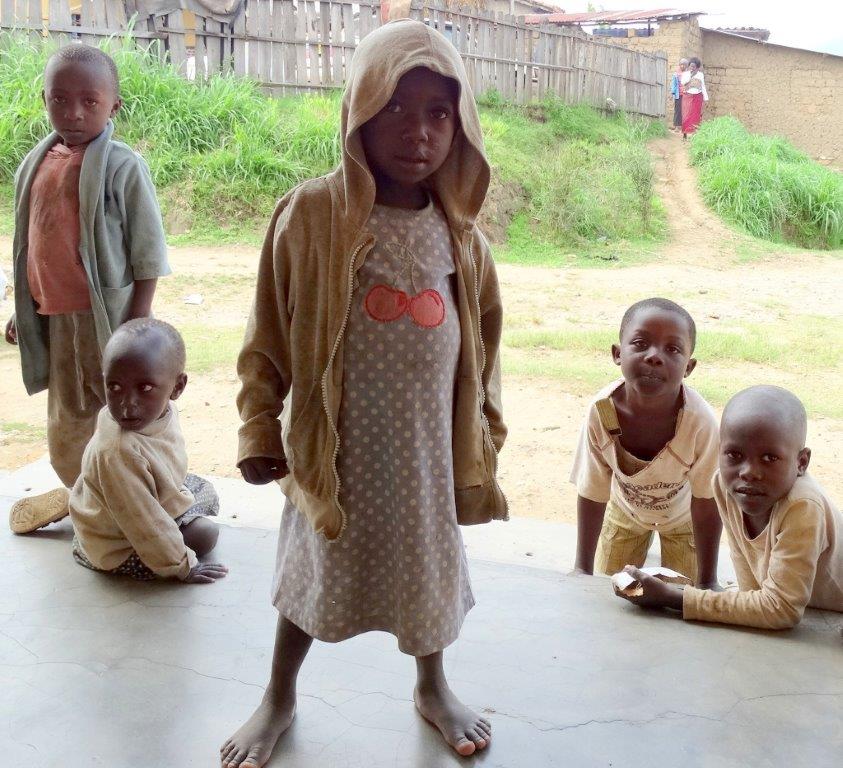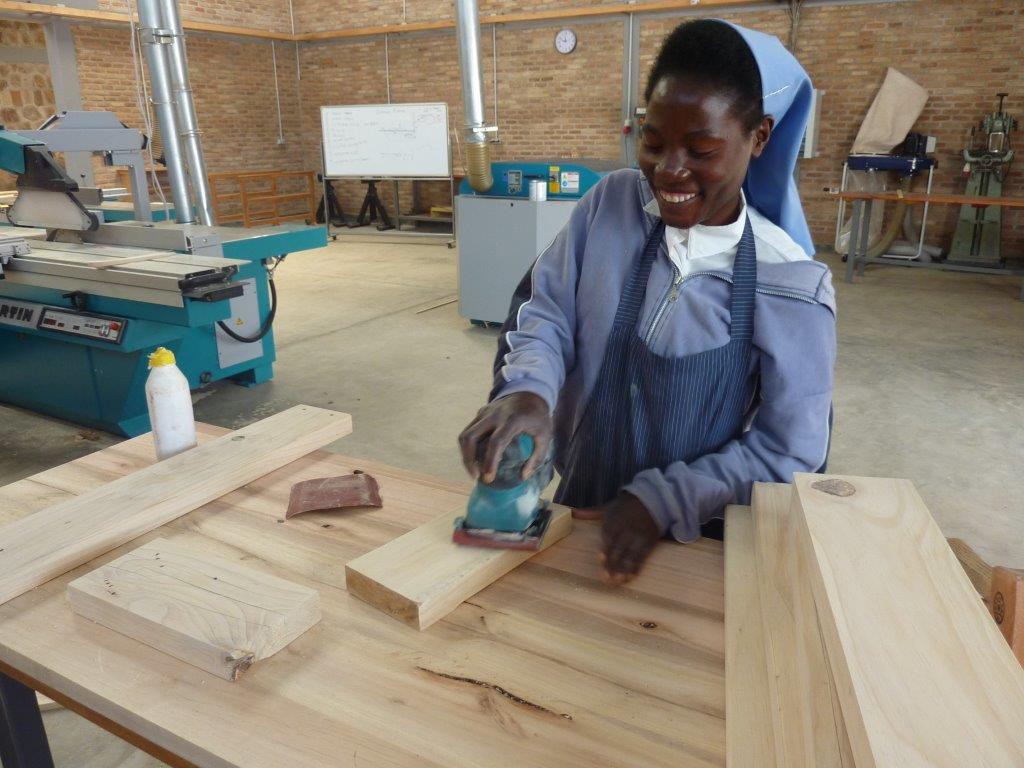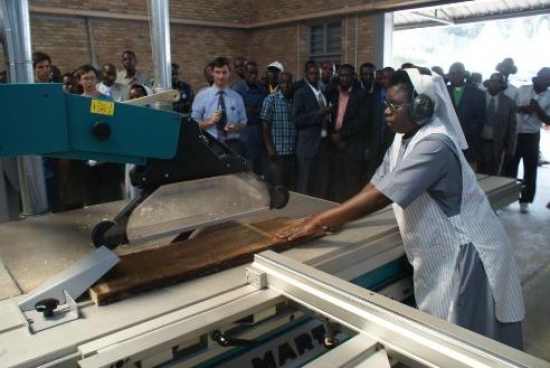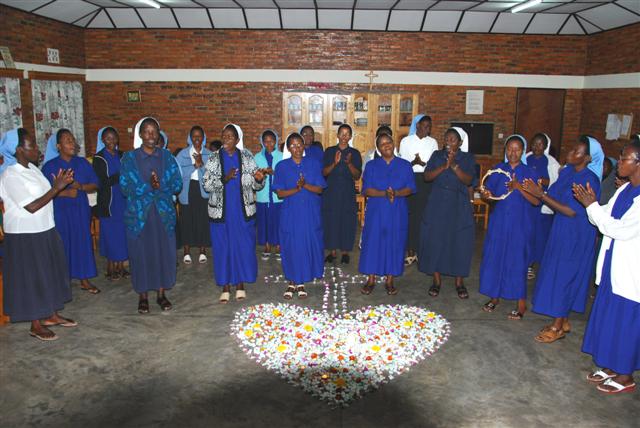Rwanda: Communauté des Diaconesses “Abaja bakristo” Rubengera
The Abaja Ba Kristo (‘Servants of Christ’) community of Deaconesses in Rubengera, Rwanda, was established in 1984. There are close connections with the Deaconess Sisters in Amerongen (Netherlands).
The sisters live in community, and wear the distinctive uniform of a deaconess.
They serve in the community in areas such as education and medical care, water supply and agricultural development, care of orphans and assistance to the elderly, diaconal and pastoral assistance.
A newsletter in August 2016 (prepared by Sister Dorien, Amerongen) contained the following information:
The Sisters
Five young women have started their probation and are doing well. They feel at home and take part in the community life. They are given lessons connected to the life as a Deaconess. Their accommodation is in a house in the former orphan’s village, and Sister Domitille takes care of them.
There are concerns for the ongoing health problems of Sister Evodie; she endures her illness bravely and is nursed by the Sisters.
Several of the Sisters have undertaken studies and achieved good results. Good education is seen as significant.
Sister Anysie and Sister Emerthe have been seconded by the Anglican Church to support some young women in their call to diaconal work. The new community’s name is ‘Esther Sisters’. The sisters pray that more young women will join this service.
The Orphan’s Village
The Orphan’s village operated for 21 years, but since March 2016, the houses in the Orphan’s village have been empty. This is because the Rwandan Government has a policy to close all orphanages, and raise children in families. The children from the Orphan’s village are now being cared for by relatives or have been adopted into families. Children who have lived in the village and are without support get follow-up care from the sisters. That means regular visits, financial sponsorship, especially for school and vocational training, advice to parents and pastoral care.

Marie Claire and adoptive parents
The foster families are under the supervision of Sister Emilienne, who visits the children regularly and monitors their well-being. Most children have settled in well to their new situation. With the support of the Dutch ‘Godparents’, they are able to continue their schooling or their professional training. The official closing of the Orphan’s village will take place during a visit by Sister Doren and Janny Oorebeek on November 16th, 2016. It will be holiday time in Rwanda, enabling many children to participate in the celebrations, including former residents.
New Project
In the coming months, a new project will be initiated: the Family Centre. This project will support the poorest families in the neighbourhood close to the Sisters. About 40 families have been selected to form self-help groups, in order to improve living conditions for their families. As well, a day care centre will be opened for children between 3 and 6 years, to prepare them for elementary school. The now empty buildings of the Orphan’s village will be used for the new project. It is anticipated the opening of the project will be January 2017.
Rubengera Technical Secondary School (RTSS)
The RTSS was inaugurated on 7th July 2012. The first group of RTSS students graduated at the end of 2015, and certificates were presented in March 2016. The great news is that every graduate gained employment, and that is extremely unusual for young people in Rwanda. The rate of unemployment is high in the country, but there is a big need for craftsmen and artisans. In this way, the school plays an important role!
Agriculture Project
In July, a new group of farmers, men and women, started a theoretical and practical training course.
Communaute Diocesses Abaja Ba Kristo-Rwanda
Address: Rubengera road, 106, Karongi, Rwanda Africa
Website: Abaja Ba Kristo, http://www.abaja-ba-kristo.nl/
Phone: 250 846 9512
Email: diaconesses@rwanda1.com
Other information to be collected includes (but is not limited to) the following questions.
A brief history (may include links to documents and websites) – how did it all get started? What are the key dates and events? Are there documents that are part of the history (please specify)?
Diaconal ministry agents: consecretrated/commissioned/ordained/other?
Historical information and dates re formation/recognition of diaconal ministry agents in the denomination/church agency
What kind of training/formation do diaconal ministry agents receive before formal recognition in their church. Are there expectations of ongoing training, or professional development? If yes, what is expected and how often does it happen?
How many diaconal ministry agents are there currently in the denomination or church agency? Any comment on trends in numbers?
Are there key people (historical or current) in the organization who have provided significant leadership. Any weblinks to their story, or a short write up?
Who are the current leaders in the diaconal association? (photos, ‘blurb’).
Relationship of diaconal ministry agents to a denomination/church agency
An overview of main responsibilities for diaconal ministry agents (past and present). Are they located within a church, a particular facility or agency, or community based? Are diaconal ministry agents appointed to individual placements or work together on projects or in institutions?
Are diaconal ministry agents able to preside at sacraments (communion, baptism, weddings etc)?
Who makes the appointments for diaconal ministry agents eg they apply for positions, they are appointed (eg by a Bishop, by the conference office, or another body/committee).
Is there a length of time for appointments (eg usually less than 5 years, usually between 5 and 10 years, at the discretion of the diaconal ministry agent or at the discretion of the appointing body), appointed to and remain with a particular mother house, etc.
Do diaconal ministry agents organize conferences, seminars, gatherings for professional development, pastoral peer support etc? How often and what is the nature of these events?
Key issues and challenges in the contemporary ministry context
Do the diaconal ministry agents have ‘code of conduct’ or ‘code of ethics’ that inform ethical and behavioral expectations for ministry?
Key documents (historical, vision and mission etc) – links or PDF or Word files
Photos
Links to relevant articles, websites etc
Other areas of interest……
(information to Rev Sandy Boyce, President, DIAKONIA World Federation, sandyeboyce@gmail.com, to upload to this website)




